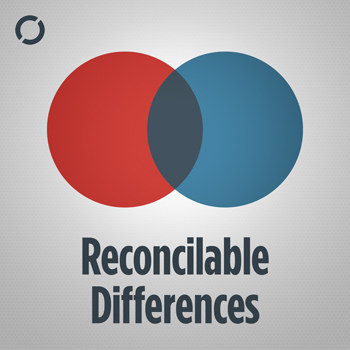Support this show
Get an ad-free version of the show, plus a monthly extended episode.#97: Invisible Work
February 7th, 2019 · 96 minutes
This week's sprawling main topic is "Emotional Labor." Who ends up ordering the birthday cake as well as justifying the ways of boss to employee?
This episode of Reconcilable Differences is sponsored by:
- ExpressVPN: High-Speed, Secure & Anonymous VPN Service. Get 3 months free with a 1-year package.
- Squarespace: Make your next move. Enter offer code DIFFS at checkout to get 10% off your first purchase.
- Burrow: The Luxury Couch for Real Life. Save $75.
Stream this episode
Links and Show Notes
This week kicks off with John reminding Merlin he needs to study up to make better jokes. Merlin thinks John just needs to buy a better long sword at the pop-up.
Things move quickly into a mini-topic on the Black Mirror episode, "Bandersnatch." Does this unusual experiment potentially represent a new way of telling stories, and can we expect to see more uses of interactive tech on TV? John has strong opinions on the platforms that are best suited for video-game-like interaction. Meanwhile, Merlin is still anxious that he picked the wrong cereal. Controversial British comedians are hotly debated.
John removes Merlin's changes to the Google Doc. Again.
Why is it that women usually get saddled with being the Office Mom (as well as the "House Mom"), and why the heck doesn't Ralphie's dad help Randy put on his snowsuit? Further, how do we account for the tonnage of invisible work that, by custom more than policy, some people end up having to both identify and do?
John thinks people don't realize how exploited they are, and Merlin cops to having bizarre personal hangups that make common power differentials infuriating.
Finally, how do we get better at identifying the unfair distribution of emotional labor, and what even can we do about it? Putting up with this stuff may come down to a coastal disposition about people who flake. The lessons of Survivor are invoked.
(Recorded on Tuesday, January 29th, 2019.)
Credits
- Audio Editor: Jim Metzendorf
- Admin Assistance: Kerry Provenzano
- Music: Merlin Mann
- The Suits: Stephen Hackett, Myke Hurley
QUBE - Wikipedia
QUBE was an experimental two-way, multi-programmed cable television system that played a significant role in the history of American interactive television.
Emotional labor - Wikipedia
Emotional labor is the process of managing feelings and expressions to fulfill the emotional requirements of a job.[1][2] More specifically, workers are expected to regulate their emotions during interactions with customers, co-workers and superiors. This includes analysis and decision making in terms of the expression of emotion, whether actually felt or not, as well as its opposite: the suppression of emotions that are felt but not expressed.
Emotion work - Wikipedia
Emotion work may be defined as the management of one's own feelings, or work done in an effort to maintain a relationship; there is dispute as to whether emotion work is only work done regulating one’s own emotion, or extends to performing the emotional work for others.
The 'invisible labor' still asked of women at work
'Women are just better at this stuff': is emotional labor feminism's next frontier? | World news | The Guardian
Dynamite (magazine) - Wikipedia
Dynamite was a magazine for children founded by Jenette Kahn and published by Scholastic Inc. from 1974 until 1992.
Life Is Strange - Wikipedia
Olivia Colman — David Tennant Does a Podcast With… — Overcast
YANSS 143 – How to Talk to People About Things – You Are Not So Smart
In this episode, we sit down with negotiation expert Misha Glouberman who explains how to talk to people about things — that is, how to avoid the pitfalls associated with debate when two or more people attempt to come to an agreement that will be mutually beneficial.
